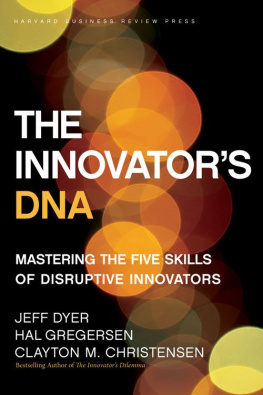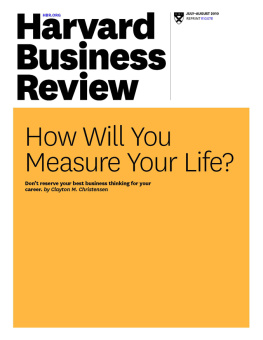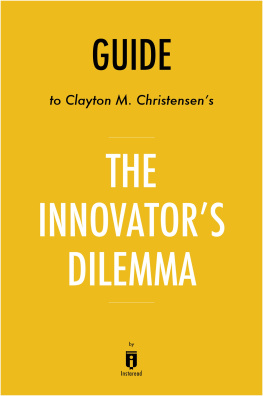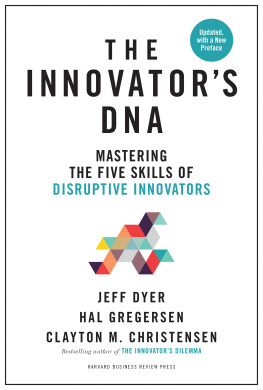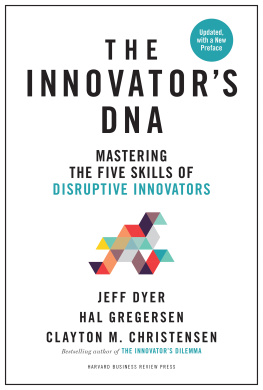
Copyright 2011 Jeff Dyer, Hal Gregersen, and Clayton M. Christensen
All rights reserved
No part of this publication may be reproduced, stored in or introduced into a retrieval system, or transmitted, in any form, or by any means (electronic, mechanical, photocopying, recording, or otherwise), without the prior permission of the publisher. Requests for permission should be directed to , or mailed to Permissions, Harvard Business School Publishing, 60 Harvard Way, Boston, Massachusetts 02163.
First eBook Edition: July 2011
ISBN: 978-1-4221-3481-8
Contents
|
| Associating |
| Questioning |
| Observing |
| Networking |
| Experimenting |
|
| People |
| Processes |
| Philosophies |
|
|
I NNOVATION. Its the lifeblood of our global economy and a strategic priority for virtually every CEO around the world. In fact, a recent IBM poll of fifteen hundred CEOs identified creativity as the number-one leadership competency of the future. The power of innovative ideas to revolutionize industries and generate wealth is evident from history: Apple iPod outplays Sony Walkman, Starbuckss beans and atmosphere drown traditional coffee shops, Skype uses a strategy of free to beat AT&T and British Telecom, eBay crushes classified ads, and Southwest Airlines flies under the radar of American and Delta. In every case, the creative ideas of innovative entrepreneurs produced powerful competitive advantages and tremendous wealth for the pioneering company. Of course, the retrospective $1 million question is, how did they do it? And perhaps the prospective $10 million question is, how could I do it?
The Innovators DNA tackles these fundamental questionsand more. The genesis of this book centered on the question that we posed years ago to disruptive technologies guru and coauthor Clayton Christensen: where do disruptive business models come from? Christensens best-selling books, The Innovators Dilemma and The Innovators Solution, conveyed important insight into the characteristics of disruptive technologies, business models, and companies. The Innovators DNA emerged from an eight-year collaborative study in which we sought a richer understanding of disruptive innovatorswho they are and the innovative companies they create. Our projects primary purpose was to uncover the origins of innovativeand often disruptivebusiness ideas. So we interviewed nearly a hundred inventors of revolutionary products and services, as well as founders and CEOs of game-changing companies built on innovative business ideas. These were people such as eBays Pierre Omidyar, Amazons Jeff Bezos, Research In Motions Mike Lazaridis, and Salesforce.coms Marc Benioff. For a full list of innovators we interviewed whom we quote in this book, see appendix A; virtually all of the innovators we quote, with the exception of Steve Jobs (Apple), Richard Branson (Virgin), and Howard Schultz (Starbucks)who have written autobiographies or have given numerous interviews about innovationare from our interviews.
We also studied CEOs who ignited innovation in existing companies, such as Procter & Gambles A. G. Lafley, eBays Meg Whitman, and Bain & Companys Orit Gadiesh. Some entrepreneurs companies that we studied were successful and well known; some were not (for example, Movie Mouth, Cow-Pie Clocks, Terra Nova BioSystems). But all offered a surprising and unique value proposition relative to incumbents. For example, each offered new or different features, pricing, convenience, or customizability compared to their competition. Our goal was less to investigate the companies strategies than it was to dig into the thinking of the innovators themselves. We wanted to understand as much about these people as possible, including the moment (when and how) they came up with the creative ideas that launched new products or businesses. We asked them to tell us about the most valuable and novel business idea that they had generated during their business careers, and to tell us where those ideas came from. Their stories were provocative and insightful, and surprisingly similar.
As we reflected on the interviews, consistent patterns of action emerged. Innovative entrepreneurs and executives behaved similarly when discovering breakthrough ideas. Five primary discovery skillsskills that compose what we call the innovators DNAsurfaced from our conversations. We found that innovators Think Different, to use a well-known Apple slogan. Their minds excel at linking together ideas that arent obviously related to produce original ideas (we call this cognitive skill associational thinking or associating). But to think different, innovators had to act different. All were questioners, frequently asking questions that punctured the status quo. Some observed the world with intensity beyond the ordinary. Others networked with the most diverse people on the face of the earth. Still others placed experimentation at the center of their innovative activity. When engaged in consistently, these actionsquestioning, observing, networking, and experimentingtriggered associational thinking to deliver new businesses, products, services, and/or processes. Most of us think creativity is an entirely cognitive skill; it all happens in the brain. A critical insight from our research is that ones ability to generate innovative ideas is not merely a function of the mind, but also a function of behaviors. This is good news for us all because it means that if we change our behaviors, we can improve our creative impact.
After surfacing these patterns of action for famous innovative entrepreneurs and executives, we turned our research lens to the less famous but equally capable innovators around the world. We built a survey based on our interviews that taps into the discovery skills of innovative leaders: associating, questioning, observing, networking, and experimenting. To date, we have collected self-reported and 360-degree data on these discovery skills from over five hundred innovators and over five thousand executives in more than seventy-five countries (for information about our assessments for individuals and companies, go to our Web site: We also published our findings in an article titled The Innovators DNA, which was the runner-up for the 2009 Harvard Business Review McKinsey Award.
Who Is Classified as an Innovator?
Perhaps one of the most surprising findings from the past thirty years of entrepreneurship research is that entrepreneurs do not differ significantly (on personality traits or psychometric measures) from typical business executives. We usually meet this finding with skepticism, since most of us intuitively believe that entrepreneurs are somehow different from other executives. Note that our research focused on innovators and, in particular, innovative entrepreneurs rather than entrepreneurs. Heres why. Innovative entrepreneurs start companies that offer unique value to the market. When someone opens a dry cleaner or a mortgage business, or even a set of Volkswagen dealerships or McDonalds franchises, researchers put them all in the same category of entrepreneur as the founders of eBay (Pierre Omidyar) and Amazon (Jeff Bezos). This creates a categorization problem when trying to find out whether

